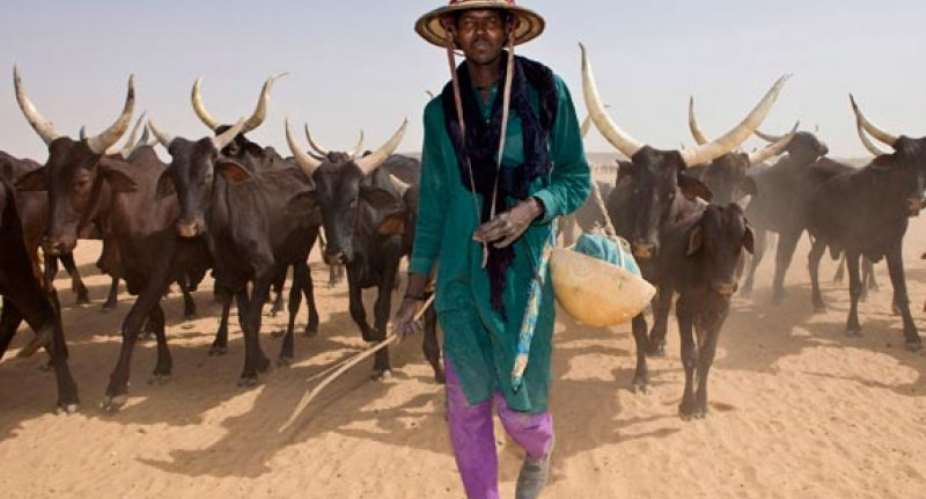A security expert at the Kofi Annan International Peacekeeping Training Centre (KAIPTC), Dr Kwesi Aning, has laid the blame for the current Fulani threat at the doorsteps of government for failing to abide by international obligations relating to the nomads.
“…Part of the challenge is not the Fulanis but state follow-ups to fulfil its international obligations to these people,” he noted in an interview with Class FM’s Emefa Apawu on Wednesday 3 February, 2016.
The Fulani have been in the news, particularly at Agogo in the Ashanti Region, where clashes between the nomads and the indigenes have resulted in several deaths, prompting the Ashanti Regional Security Council (REGSEC) to deploy military personnel and policemen from the capital to the Asante Akyem North District of the region, to drive out the herdsmen, who have been terrorising inhabitants of the area.
The youth and chiefs of Agogo have also issued a warning to citizens not to render any kind of service, such as selling of food items, farm implements, tools, and transport services to the Fulani.
But Dr Aning said government should have anticipated the current crisis and implemented measures to prevent the situation from deteriorating to its current situation.
According to him, Ghana signed an international treaty regarding the nomads, who move across countries in search of pasture for their cattle.
“What we now see as a Fulani problem is because we, as Ghanaians and the state, have also failed to fulfil international obligations. We have resident Ghanaian Fulanis and migratory Fulanis, who come with their cattle every year. There is a 1986 ECOWAS regulation on transhumance that clearly states and recognises this Fulani cultural heritage of moving their cattle to follow the rainfall pattern of West Africa,” explained the security expert.
“It is an international consensus. We have agreed to provide facilities, particular corridors, dips, veterinary services, and then, in exchange, 10 per cent of all the cows born in this country are left behind,” he underscored.
Dr Aning further explained that the country had failed to implement laws governing the rearing of cattle.
He has charged authorities to identify the owners of the cattle, who have failed to build proper structures to house the animals, and not the Fulanis, who are just caretakers.
“If you own cattle, there are also rules around us. So, whether you are a big man or woman, who owns cattle, you cannot flout the law. Were Fulanis to be interviewed to say [those], who own those cattle have refused to build a farm to raise the cattle, then if we get those names we should chase the owners and not the Fulanis. Fulanis must be given a voice,” he added.





 We’re disappointed over gov’t’s lacklustre attitude to negotiations of our condi...
We’re disappointed over gov’t’s lacklustre attitude to negotiations of our condi...
 No more Buffer Stock as Mahama promises to decentralise SHS food supply
No more Buffer Stock as Mahama promises to decentralise SHS food supply
 NSS urges President Akufo-Addo to sign National Service Bill into law
NSS urges President Akufo-Addo to sign National Service Bill into law
 You're lying, your 7-11pm dumsor attributed to overloaded transformers is false ...
You're lying, your 7-11pm dumsor attributed to overloaded transformers is false ...
 Consult Council of State on anti-gay bill – Mahama advises Akufo-Addo
Consult Council of State on anti-gay bill – Mahama advises Akufo-Addo
 Transport Ministry has no power to determine fares – COPEC
Transport Ministry has no power to determine fares – COPEC
 Brace yourselves for more economic hardship – Prof Adei to Ghanaians
Brace yourselves for more economic hardship – Prof Adei to Ghanaians
 Any government depending on IMF is likely to fail – Grand Coalition
Any government depending on IMF is likely to fail – Grand Coalition
 Ghana risks losing premium cocoa position due to galamsey – COCOBOD laments
Ghana risks losing premium cocoa position due to galamsey – COCOBOD laments
 Akufo-Addo launches NSS policy document to tackle under-utilisation of service p...
Akufo-Addo launches NSS policy document to tackle under-utilisation of service p...
